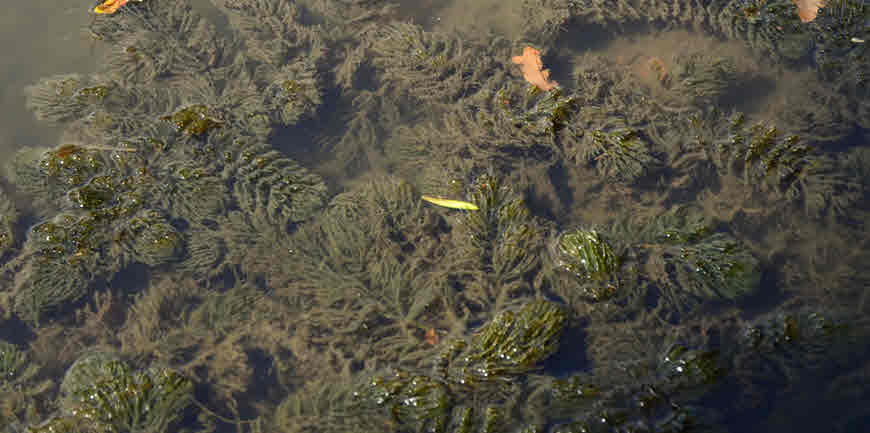Ceratophyllum demersum is also known as Coontail, Hornwort, Sheivalam, Jalnili, Jalaja, Shaival, Velampasi, and Sevar. It is an aquatic plant found all over India from temperate to tropics, in ponds, and lakes. It is a dicotyledonous, submerged aquatic angiosperm belonging to the family Ceratophyllaceae.

Coontail is used as a health supplement as it is low in calories, and rich in protein, calcium, and magnesium. It contains ferredoxin, and plastocyanin. It is antimicrobial, antibacterial, antibilious, and purgative.
The whole plant has been traditionally used in the treatment of wounds, fever, burning sensation, hemorrhoids or piles, intrinsic hemorrhages, hyperdipsia, epistaxis, and hematemesis.
Coontail is prescribed for cardiac infections, giddiness, hypothermia, leucorrhoea, morbid thirst, rheumatism spermaturia, venereal diseases. Leaf juice is used to stop vomiting, as a cooling agent, and to cure skin disorders.
About Coontail | Hornwort | Hornweed
Coontail is a cosmopolitan free-floating aquatic plant. It is submerged, perennial macrophyte without any roots, and floats in water. It grows fast in shallow, muddy, quiescent water bodies at low light intensities.
The herb bears feathery leaves which are arranged in whorls on the stem. It is branched but with one branch per node. The leaves are dark green, sessile, rigid, and the plant capture nutrients through the leaves. It has a wide ecological tolerance, and grows relatively fast
Coontail is monoecious (individual flowers are either male or female, but both sexes can be found on the same plant), and is pollinated by Water.
Coontail can be found in fresh, and slightly brackish water, and as a peculiarity mostly in waters with a rich nutrients status, thereby providing a benefit to water quality because it acts as a filter. It is a popular aquatic plant for aquaria, and ornamental ponds.
Vernacular Names of Hornwort
- English: Coontail, Hornwort
- Ayurvedic: Shaivala, Jalnili, Jalaja, Jalini
- Hindi: Shaival
- Unani: Tuhlub, Pashm Vazg
- Persian: Pashm vazg
- Arabic: Tuhlub
- Siddha: Velampasi
- Folk: Sevaar
Classification of Ceratophyllum demersum
- Domain: Eukaryota
- Kingdom: Plantae
- Phylum: Spermatophyta
- Subphylum: Angiospermae
- Class: Dicotyledonae
- Order: Nymphaeales
- Family: Ceratophyllaceae
- Genus: Ceratophyllum
- Specie: demersum
Parts used
Whole plant
The dose of the Whole plant
- 10 – 20 ml juice
- 50 – 100 ml decoction
Ayurvedic Properties, and Action
Shaival is considered astringent, bitter, sweet, and pungent in taste (Rasa), pungent after digestion (Vipaka), and is cool in effect (Virya).
- Rasa (taste on the tongue): Kashaya (Astringent), Madhura (Sweet), Tikta (Bitter)
- Guna (Pharmacological Action): Laghu (Light), Snigdha (Unctuous)
- Virya (Action): Shita (Cooling)
- Vipaka (transformed state after digestion): Katu (Pungent)
It is a Sheet Virya herb. Sheet Virya or Cool potency herb subdues Pitta (Bile) Vata (Wind), and increases Kapha (Mucus). Sheet Virya herb gives nourishment to the body, and steadiness. It supports the building of the body fluids.
It is a Katu Vipak herb. Vipak refers to post-digestive (effect after digestion/cooking of Rasa) effect of tastes after its mixing with digestive juices. It is the long term effect of the herb.
Katu Viapk herb increases dryness in the body. Such foods Kapha. Excess intake of such foods aggravates Vata, and gas in the body.
It is Madhur Vipak (digests into sweet), and has a building, moistening, and a nourishing effect on the body. Such herbs are cooling, and reduce swelling, decreases Pitta, and have Anabolic effect on the body.
Ayurvedic Action
- Balya: Enhances strength.
- Brinhana: Nourishes the body due to heavy, cold, fine, unctuous, viscid properties.
- Tridoshahara: Reduces all three Dosha.
- Vasti Shodhan: Cleanses the urinary system
- Vatahara: Pacifies Vata Dosha
- Vrishya: Increases the quantity of semen
- Vajikarak: Aphrodisiac
Medicinal Properties
- Analgesic: Acting to relieve pain.
- Anti-inflammatory: Reducing inflammation by acting on body mechanisms.
- Aphrodisiac: Stimulates sexual desire.
- Cooling: Lower body temperature to relieve pain, swelling, and reduces body heat.
- Diuretic: Promoting excretion of urine/agent that increases the amount of urine excreted.
- Tonic: Restore or improve health or well-being.
Coontail Indications
- Bleeding disorders
- Burning sensation
- Dehydration
- Diarrhea
- Dysentery
- Excessive thirst
- Fever
- Health supplement
- Malnutrition
- Piles
- Ulcers
Coontail Health Benefits
Coontail is antibacterial, antibilious, antimicrobial, astringent, refrigerant, hemostatic, and antipyretic. It is beneficial in dialarhoea, dysentery, hyperdipsia, nose bleed, hemoptysis, diseases of the skin, intermittent fever, ulcers, and piles.
Prevents internal bleeding
In Ayurveda, Coontail is known as Shaivala, Jalnili, and Jalaj. Traditionally, it is indicated in intrinsic hemorrhages, and excessive heat inside the body.
Coontail is cool in potency, and pacifies Pitta Dosha. It reduces the heat inside the body, and thus prevents abnormal bleeding.
High in Nutrition
Coontail is rich in protein (24.6 %), calcium, and magnesium. It contains ferredoxin, and plastocyanin. The extract of herb contains polysaccharides, containing D-galactose, D-xylose, L-arabinose, L-rhamnose, uronic acid, and acidic xylan, and an arbino galactan.
Good for the heart
Coontail is beneficial for the heart. The medicated clarified butter prescribed is useful in cardiac affections.
Antimicrobial Qualities
Coontail has antimicrobial action. It has shown activity against Mycobacterium smegmatis, Candida albicans, and Fusarium sambucinum syn. F. roseum.
Beneficial in Piles, and hemorrhoids
Coontail is a cooling in action, and gives relief in the burning sensation. It is applied topically on the piles mass.
Reduces Excessive heat inside the body
Coontail is refrigerant in action, and its intake gives relief in the burning sensation of palm-sole, fever, painful urination, burning sensation in the body, ulcers, and nose bleed.
For this purpose, the fresh juice of the plant are taken in the amount of 10-15ml, twice daily for 7- 10 days. This cures biliousness, and ulceration.
Stops loose motion
Coontail is given in case of loose motion. It helps in diarrhea, dysentery due to astringent qualities.
Coontail Side Effects
It has no known side effect.